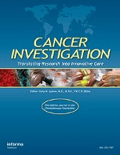
CANCER INVESTIGATION
Scope & Guideline
Illuminating pathways in oncology through peer-reviewed excellence.
Introduction
Aims and Scopes
- Molecular and Cellular Oncology:
Research focusing on the molecular mechanisms underlying cancer biology, including genetic mutations, signaling pathways, and tumor microenvironment interactions. - Clinical Trials and Therapeutics:
Studies evaluating the efficacy and safety of new cancer treatments, including chemotherapy, immunotherapy, and targeted therapies, often supported by clinical trial data. - Epidemiology and Cancer Prevention:
Investigations into cancer risk factors, screening methods, and preventive strategies, aiming to reduce cancer incidence and improve early detection. - Translational Research:
Studies that bridge laboratory findings with clinical applications, translating basic research into practical interventions for cancer patients. - Patient-Centered Research:
Research emphasizing patient-reported outcomes, quality of life assessments, and the psychosocial aspects of cancer care. - Bioinformatics and Computational Biology:
Utilization of computational methods to analyze genomic, transcriptomic, and proteomic data for cancer research, enhancing predictive modeling and personalized medicine.
Trending and Emerging
- Artificial Intelligence and Machine Learning Applications:
There is a growing trend in utilizing AI and machine learning for predictive modeling, diagnostic imaging analysis, and personalized treatment strategies, reflecting the integration of technology in oncology. - Immunotherapy and Targeted Therapy Research:
Research focused on immunotherapeutic agents and targeted therapies has significantly increased, driven by advancements in understanding the immune system's role in cancer. - Microbiome and Cancer Interactions:
Emerging studies exploring the relationship between the gut microbiome and cancer progression or treatment response are gaining traction, highlighting the interconnectedness of health and disease. - Cancer Health Disparities:
An increasing number of studies address cancer health disparities, focusing on how socioeconomic factors, race, and access to care impact cancer outcomes. - Longitudinal and Real-World Evidence Studies:
Research utilizing longitudinal data and real-world evidence to assess treatment outcomes and patient experiences is on the rise, providing insights beyond traditional clinical trial settings.
Declining or Waning
- Traditional Chemotherapy Studies:
Research centered solely on traditional chemotherapy regimens has decreased as newer targeted therapies and immunotherapies have gained prominence in cancer treatment. - Basic Science without Clinical Relevance:
Papers focusing exclusively on basic science without clear translational potential or clinical implications have become less frequent, as the journal shifts towards more impactful research. - Single-Institution Studies:
There has been a noticeable decline in studies conducted at single institutions that do not contribute novel insights or broader implications, as multi-center collaborations become more valued. - Palliative Care Focused Research:
While important, research solely dedicated to palliative care aspects of cancer treatment has waned, possibly due to a shift towards curative approaches and survivorship studies. - Historical Epidemiological Studies:
The prevalence of studies focused on historical cancer epidemiology has diminished, with a growing emphasis on contemporary data and real-time analysis.
Similar Journals
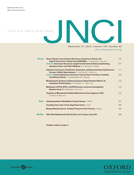
JNCI-Journal of the National Cancer Institute
Advancing cancer research for a brighter tomorrow.JNCI-Journal of the National Cancer Institute, published by Oxford University Press Inc. in the United Kingdom, is a premier journal dedicated to advancing the field of cancer research and oncology. With a distinguished history dating back to 1940, this journal has consistently maintained a strong reputation within the academic community, achieving a remarkable Q1 ranking in both Cancer Research and Oncology as of 2023. Researchers and practitioners rely on the JNCI for original research articles, review papers, and cutting-edge findings that impact clinical practices and therapeutic strategies. Although it does not currently offer open access, the journal remains a vital resource for academicians and healthcare professionals seeking to enhance their understanding of cancer mechanisms and treatment innovations. Its rigorous peer-review process ensures the publication of high-quality, credible research that meets the evolving challenges of cancer treatment and prevention through to 2024.

JOURNAL OF CANCER RESEARCH AND CLINICAL ONCOLOGY
Illuminating the Pathways of Cancer Discovery and Treatment.JOURNAL OF CANCER RESEARCH AND CLINICAL ONCOLOGY, published by Springer, is a prestigious peer-reviewed journal dedicated to advancing the fields of cancer research and clinical oncology. With an impact factor reflecting its significance within the academic community, the journal operates under a rigorous quality standard and offers a wealth of knowledge spanning from 1979 and continuing through 2025. With its comprehensive scope, it encompasses a wide array of topics including novel therapeutic strategies, clinical trials, and cutting-edge research methodologies, making it an essential resource for researchers, practitioners, and students alike. The journal’s category quartiles highlight its competitive edge, ranking Q2 in Cancer Research and Q1 in Medicine (miscellaneous) as of 2023. This positioning underscores its role at the forefront of oncology discourse. Through this journal, contributors and readers alike engage with impactful research that informs clinical practices and enhances patient care in oncology. Access to the journal’s content, although not open access, ensures curated and high-quality insights available to the academic and professional community.
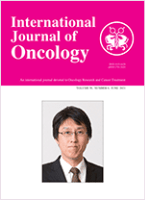
INTERNATIONAL JOURNAL OF ONCOLOGY
Illuminating the path to effective cancer therapies.INTERNATIONAL JOURNAL OF ONCOLOGY is a leading academic publication dedicated to advancing the field of cancer research and treatment. Published by SPANDIDOS PUBL LTD in Greece, this journal, with ISSN 1019-6439 and E-ISSN 1791-2423, has established itself as a reputable source of peer-reviewed articles since its inception in 1993. With an impressive Q2 ranking in both Cancer Research and Oncology categories, as well as high Scopus ranks reflecting its significant contribution to the fields of Medicine and Biochemistry, the journal offers a platform for researchers, clinicians, and students alike to disseminate their findings and engage in dialogue surrounding innovative practices and breakthroughs. Although the journal follows a traditional subscription model, it continues to attract a diverse readership interested in the latest developments in oncological research, providing essential insights into cancer biology, therapeutics, and patient care. With a commitment to excellence, the INTERNATIONAL JOURNAL OF ONCOLOGY plays a vital role in shaping the future of oncology research and is a must-read for anyone passionate about advancing cancer treatment and prevention.

Frontiers in Oncology
Innovating oncology through open access and collaboration.Frontiers in Oncology is a premier open access journal dedicated to advancing the field of oncology through innovative research and knowledge dissemination. Published by FRONTIERS MEDIA SA since 2011, this journal is based in Switzerland and holds an impressive Q2 ranking in both Cancer Research and Oncology as of 2023, highlighting its significance in the academic community. With its commitment to open access, Frontiers in Oncology ensures that vital research is readily available to researchers, healthcare professionals, and students around the globe, enhancing collaboration and fostering breakthroughs in cancer research. The journal's robust Scopus rankings further illustrate its academic influence, with notable positions in the fields of Oncology and Cancer Research. By covering a wide range of topics within oncology, this journal serves as a vital resource, supporting the rapid evolution of cancer treatment, diagnostics, and patient care strategies.

Wspolczesna Onkologia-Contemporary Oncology
Driving Clinical Applications with Groundbreaking StudiesWspolczesna Onkologia - Contemporary Oncology is a leading open-access journal dedicated to the field of oncology and radiology, published by TERMEDIA PUBLISHING HOUSE LTD since 1999. With its ISSN 1428-2526 and E-ISSN 1897-4309, the journal has established a prominent place in scholarly publishing, contributing significantly to the advancement of cancer research and treatment modalities. Located in Poznań, Poland, it operates within a framework of high academic standards, currently holding a Q3 quartile ranking in Oncology and Q2 in Radiology, Nuclear Medicine, and Imaging for the year 2023. The journal serves as a valuable resource for researchers, medical professionals, and students alike, providing a platform for innovative studies and reviews that drive the clinical application of oncological practices. With its commitment to open access, Wspolczesna Onkologia allows for widespread dissemination of knowledge, ensuring that cutting-edge research is accessible to a global audience, thus bridging gaps in cancer care and fostering collaborative advancements in the field.

World Journal of Oncology
Elevating oncology knowledge for a healthier tomorrow.The World Journal of Oncology, published by ELMER PRESS INC, is a vibrant platform for disseminating groundbreaking research and advancements in the field of oncology. With its ISSN 1920-4531 and E-ISSN 1920-454X, this journal is dedicated to publishing high-quality studies that enhance our understanding of cancer and its treatment. The journal is recognized for its significant contributions, evidenced by its Q2 classification in both Cancer Research and Oncology categories in 2023, and accolades such as a Scopus rank of #126/404 in Medicine _ Oncology. Catering to the needs of researchers, professionals, and students, the World Journal of Oncology offers an essential resource for the latest scientific insights and clinical practices, ensuring the global oncology community remains informed and engaged. The journal operates under a selective publication model, maintaining rigor in peer review while facilitating knowledge sharing across converged years from 2014 to 2016 and 2020 to 2024, further establishing its importance in the ongoing fight against cancer.

Cancer Cell International
Empowering Discovery in OncologyCancer Cell International, published by BMC, is a transformative open-access journal established in 2001, dedicated to advancing the field of oncology and cancer research. With its ISSN number not specified and an E-ISSN of 1475-2867, the journal proudly operates from the United Kingdom, located at CAMPUS, 4 Crinan St, London N1 9XW, England. Renowned for its rigorous peer-review process, Cancer Cell International has made significant strides, securing a Q2 ranking in Cancer Research and Q1 rankings in both Genetics and Oncology as of 2023. It ranks impressively in Scopus, featuring in the top quintile of Genetics (#37/347) and Oncology (#52/404), indicating its importance within the scientific community. The journal's broad scope caters to a diverse array of topics within cancer biology, making it an invaluable resource for researchers, professionals, and students seeking to stay at the forefront of cancer science. With a commitment to disseminating high-quality research, Cancer Cell International invites scholars to explore innovative findings and contribute to the collective effort of combating cancer.
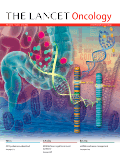
LANCET ONCOLOGY
Leading the way in oncology research and clinical excellence.The Lancet Oncology is a premier peer-reviewed journal published by Elsevier Science Inc., recognized as a leading authority in the field of oncology. With an ISSN of 1470-2045 and E-ISSN 1474-5488, this esteemed journal boasts an impressive 2023 impact factor placing it in the Q1 category of oncology—reflecting its role as a critical resource for cutting-edge research. The journal publishes high-quality articles covering novel scientific discoveries, clinical advancements, and public health issues related to cancer treatment and prevention. It is ranked #5 out of 404 in the Scopus Medicine _ Oncology category, demonstrating its influence and relevance in the field, with an outstanding rank in the 98th percentile. Operating from its base in the United Kingdom, The Lancet Oncology spans a comprehensive timeframe from 2000 to 2024, making it a vital repository of oncology literature. Although it does not primarily operate on an open-access model, its significant subscription base ensures that a wealth of knowledge is accessible to researchers, professionals, and students alike, fostering a profound understanding and advancement in oncology.
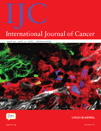
INTERNATIONAL JOURNAL OF CANCER
Exploring the frontiers of cancer science and treatment.INTERNATIONAL JOURNAL OF CANCER, published by Wiley, stands as a premier platform for the dissemination of cutting-edge research in the fields of cancer research and oncology. With an impressive impact factor reflecting its rigorous peer-review process and significant contribution to the scientific community, this journal is categorized in Q1 for both Cancer Research and Oncology as of 2023. It boasts notable rankings, being placed 38th among 404 journals in Medicine - Oncology and 32nd among 230 in Biochemistry, Genetics, and Molecular Biology - Cancer Research, positioning it within the 90th and 86th percentiles, respectively. Since its inception in 1966 and continuing to 2024, the journal has played a pivotal role in advancing our understanding of cancer biology, treatment modalities, and innovative therapeutic approaches. While it operates under a subscription model, the journal is committed to making valuable research accessible to a broader scientific audience. Researchers, professionals, and students alike will find the INTERNATIONAL JOURNAL OF CANCER an essential resource for staying abreast of the latest advancements in cancer science.
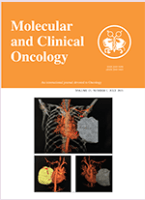
Molecular and Clinical Oncology
Innovating cancer care through rigorous research.Molecular and Clinical Oncology is a dynamic journal published by SPANDIDOS PUBL LTD, aimed at advancing the understanding of cancer biology and treatment modalities. With an ISSN of 2049-9450 and an E-ISSN of 2049-9469, the journal serves as a critical platform for researchers and clinicians dedicated to uncovering novel insights in molecular oncology and enhancing clinical practices. As a testament to its growing influence, the journal has achieved a Q3 ranking in Oncology and a Q4 ranking in Cancer Research for the year 2023, reflecting its commitment to publishing high-quality research. Although currently not an Open Access publication, the journal offers crucial subscription options, ensuring comprehensive access to groundbreaking studies and innovations in the field. With converged years spanning 2018 to 2024, the journal is set to continue enriching the academic community with its valuable contributions, ultimately empowering researchers, professionals, and students engaged in the fight against cancer.